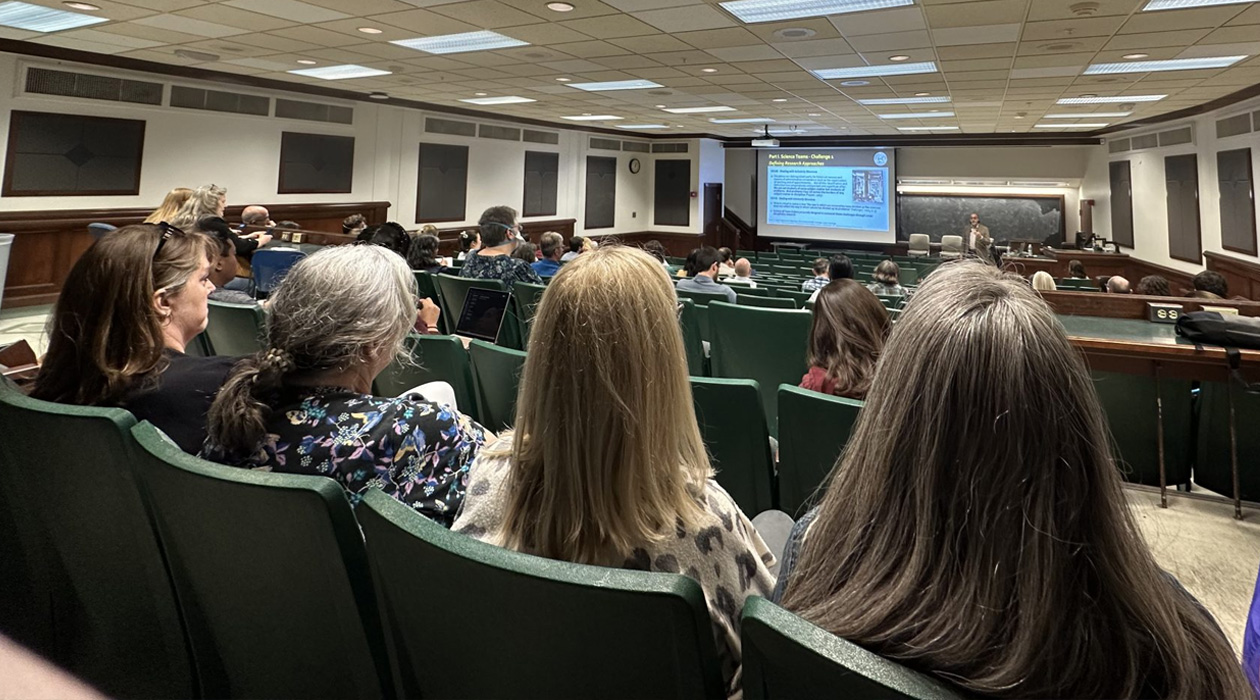Advancing research collaboration: Exploring the practice of team science

The Science and Practice of Team Science panel discussion featured Stephen Fiore, PhD, Director of the Cognitive Sciences Laboratory at University of Central Florida and Melanie Bauer, Grant Writing Manager at Nova Southeastern University / Rosemary Keane
Researchers from across campus gathered for The Science and Practice of Team Science panel discussion hosted by the Carl R. Woese Institute for Genomic Biology and co-sponsored by the Center for Social & Behavioral Science. The panel featured Stephen Fiore, PhD (Director of the Cognitive Sciences Laboratory at University of Central Florida) and Melanie Bauer (Grant Writing Manager at Nova Southeastern University) who shared their experiences and perspectives on how to strengthen collaboration in research teams.
Fiore introduced the audience to three core challenges at the heart of the study of team science: defining what it means to do cross-disciplinary research, understanding the existing science behind team science, and attending to the teamwork required within science teams. He noted that the structure of academia often separates disciplines for administrative purposes, but that our most pressing problems rarely fall neatly into disciplinary boxes, sharing that we are not merely “students of subject matter, but students of problems.” Tackling complex societal issues demands integrated approaches; understanding how teams function is crucial to making those approaches work.
Fiore spoke to the importance of mission alignment in cross-disciplinary teams and the value of drawing from the robust scholarly literature on teamwork and group dynamics. He stated there is need to train scientists not just in taskwork (methods, analysis, writing) but also in teamwork (skills like trust-building, conflict management, and communication). These so-called “ABCs of teamwork,” attitude, behavior, and cognition, can significantly influence how research teams learn and perform.
Bauer brought those ideas into the day-to-day realities of collaborative work by drawing on her leadership with the Florida Research Development Alliance and her experience coaching transdisciplinary teams. She emphasized the practical value of supporting researchers through team coaching, describing research development professionals as people who operate across institutional hierarchies, without ego, driven by the shared goal of “raising all ships.”
Her perspective underscored that team science does not need to be resource-heavy to be effective. “You don’t have to be a team science expert to make a difference,” Bauer said. “Sometimes, it just takes a few powerful questions and a bit of reflection to keep a team moving forward.” A simple check-in, a structured moment for feedback, or a thumbs up/thumbs down vote in a Zoom meeting can foster psychological safety and ensure that everyone is heard before key decisions are made.
Audience members raised a common concern: how can researchers justify the time and effort needed to focus on collaboration when they are already stretched thin? Fiore’s answer was direct: “Show them the data.” Studies show that interdisciplinary teams produce higher-impact publications and yield more disruptive research. Bauer added that embedding reflective practices does not involve major infrastructure or funding. “You can start small,” she said, encouraging teams to sprinkle in collaborative tools in manageable ways rather than overhaul their systems all at once.
Attendees were invited to carry the conversation into the reception at the IGB Gatehouse, reflecting on two overarching questions: What are some questions you have about the science and practice of team science after today’s discussion? And what services or resources could meaningfully enhance team science practice at Illinois? Attendees shared their thoughts via sticky notes and informal conversations, developing ideas for future programming and support.
As research questions grow more complex, events like this remind us that collaboration will become the norm rather than the exception. By bridging research and practice, and by making room for reflection alongside discovery, the science and practice of team science offers a path forward for teams seeking to do meaningful, high-impact work together.
